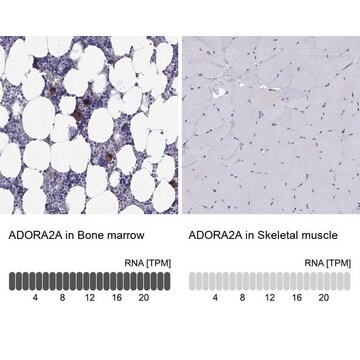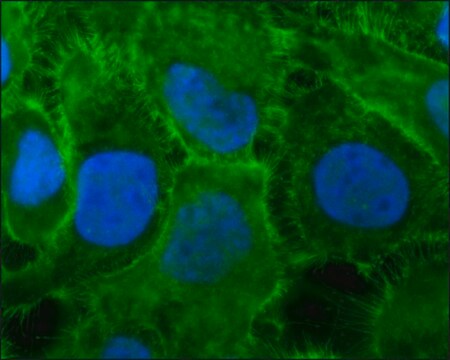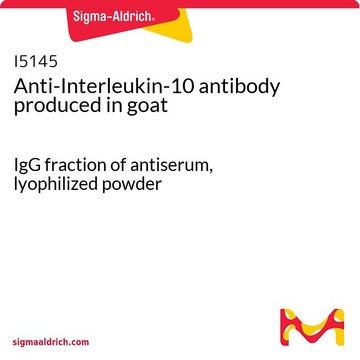HTS153RTA
Ready-to-Assay GPR68/OGR1 Proton-Sensing Receptor Frozen Cells
Human GPR68/OGR1 GPCR frozen cells for Calcium Flux FLIPR Assays.
Zaloguj sięWyświetlanie cen organizacyjnych i kontraktowych
About This Item
Kod UNSPSC:
41106514
eCl@ss:
32011203
Polecane produkty
Opis ogólny
Millipore’s Ready-to-Assay GPCR frozen cells are designed for simple, rapid calcium assays with no requirement for intensive cell culturing. Millipore has optimized the freezing conditions to provide cells with high viability and functionality post-thaw. The user simply thaws the cells and resuspends them in media, dispenses cell suspension into assay plates and, following over night recovery, assays for calcium response.
GPR68, also known as OGR1 (ovarian cancer G-protein-coupled receptor 1), was initially thought to be a receptor for sphingosylphosphorylcholine, although these results are controversial. Subsequent studies indicated that GPR68/OGR1 functions as a Gq-coupled sensor for extracellular pH, with maximal signaling occurring at pH of 7 or below (Ludwig et al., 2003; Tomura et al., 2005). Expression of GPR68/OGR1 is upregulated during RANKL-induced osteoclast differentiation, and knockdown of GPR68/OGR1 expression inhibits this differentiation process (Yang et al., 2006). Millipore’s cloned human GPR68-expressing cell line is made in the Chem-1 host, which supports high levels of recombinant GPR68 expression on the cell surface and contains high levels of the promiscuous G protein G15 to enhance coupling of the receptor to the calcium signaling pathway. Thus, the cell line is an ideal tool for screening for antagonists of interactions between GPR68 and its ligands.
GPR68, also known as OGR1 (ovarian cancer G-protein-coupled receptor 1), was initially thought to be a receptor for sphingosylphosphorylcholine, although these results are controversial. Subsequent studies indicated that GPR68/OGR1 functions as a Gq-coupled sensor for extracellular pH, with maximal signaling occurring at pH of 7 or below (Ludwig et al., 2003; Tomura et al., 2005). Expression of GPR68/OGR1 is upregulated during RANKL-induced osteoclast differentiation, and knockdown of GPR68/OGR1 expression inhibits this differentiation process (Yang et al., 2006). Millipore’s cloned human GPR68-expressing cell line is made in the Chem-1 host, which supports high levels of recombinant GPR68 expression on the cell surface and contains high levels of the promiscuous G protein G15 to enhance coupling of the receptor to the calcium signaling pathway. Thus, the cell line is an ideal tool for screening for antagonists of interactions between GPR68 and its ligands.
Opis linii komórkowej
GPCR Cell Lines
Host cells: Chem-1
Działania biochem./fizjol.
GPCR Class: A
Protein Target: GPR68/OGR1
Target Sub-Family: SPC/LPC /proton-sensor
Komponenty
Pack contains 2 vials of mycoplasma-free cells, 1 ml per vial.
Fifty (50) mL of Media Component.
Fifty (50) mL of Media Component.
This page may contain text that has been machine translated.
Kod klasy składowania
10 - Combustible liquids
Klasa zagrożenia wodnego (WGK)
WGK 1
Temperatura zapłonu (°F)
Not applicable
Temperatura zapłonu (°C)
Not applicable
Certyfikaty analizy (CoA)
Poszukaj Certyfikaty analizy (CoA), wpisując numer partii/serii produktów. Numery serii i partii można znaleźć na etykiecie produktu po słowach „seria” lub „partia”.
Masz już ten produkt?
Dokumenty związane z niedawno zakupionymi produktami zostały zamieszczone w Bibliotece dokumentów.
Nasz zespół naukowców ma doświadczenie we wszystkich obszarach badań, w tym w naukach przyrodniczych, materiałoznawstwie, syntezie chemicznej, chromatografii, analityce i wielu innych dziedzinach.
Skontaktuj się z zespołem ds. pomocy technicznej





